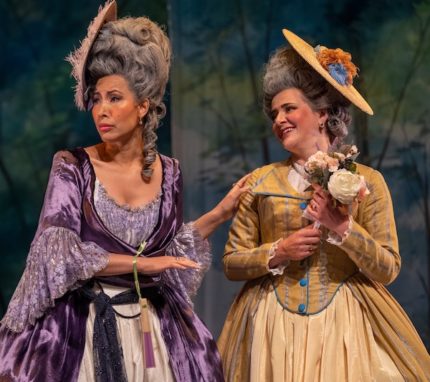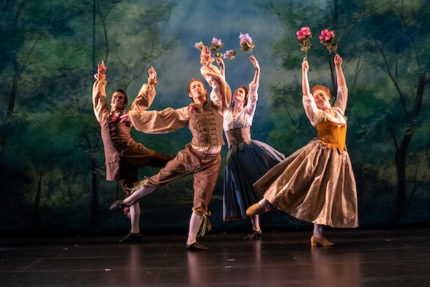Haymarket Opera revives a romantic gem with Bologne’s “L’Amant anonyme”

Haymarket Opera Company’s Midwest premiere of L’Amant anonyme (The Anonymous Lover) by Joseph Bologne (Chevalier de Saint-Georges) Friday night in Holtschneider Performance Center at DePaul University was a happy affair, in several respects.
This lively, period-perfect show continues the Chicago-based ensemble’s return to fully staged performances this season, which opened with Stradella’s oratorio La Susanna in March.
These weekend performances, however, are introducing the HOC audience to Jarvis Opera Hall. With 160 seats this is a perfect gem of a theater, with good sight-lines, a clear acoustic, and an inviting intimacy ideally suited to Bologne’s Gallic rom-com from the Age of Enlightenment.
What a surprise, too, to discover Bologne’s 1790 romantic confection, a slight but utterly charming piece that is the only surviving opera by the biracial composer of French-Senegalese lineage (1745-99). Once lamentably labeled as “The Black Mozart,” the composer is lately the object of a veritable Bologne boom in performance and on recording.
A stage work that has languished in near-obscurity for some 230 years has reemerged as if freshly minted. And there could be no more appropriate ensemble to deliver the Chicago professional premiere than Haymarket. Since its first season in 2011, the company has fascinated local listeners with its excursions into mostly obscure Baroque and Classical repertoire, realized with painstaking attention to historically informed performance style, period stage manners and finely detailed costumes and decor.
Under the trusty hands of artistic director Craig Trompeter and stage director Sarah Edgar, the show was replete with lavish period costumes by Stephanie Cluggish, extended ballet sequences choreographed by Edgar and an elegant, hand-painted set designed by Wendy Waszut-Barrett, subtly illuminated by designer Brian Schneider.
The look and sound harked to late 18th century France when aristocrats in powdered wigs and silken finery would present such fare for the delectation of their peers at the Sun King’s country palace. Never mind that the rumbles of Revolution were already to be heard beyond the manicured gardens of Versailles.

That said, HOC’s Anonymous Lover carried a contemporary freshness and energy born of the caring ministrations of a strong ensemble of period instrumentalists, singers and dancers. The six vocalists were requited to memorize long stretches of spoken and sung dialog that they delivered with remarkably good Gallic diction —and without a prompter in sight.
The refined galant craftsmanship of his music for L’Amant anonyme amply justifies modern revival. Parts of the score sound like Mozart, parts like such French contemporaries as Gretry. Bologne may not have been their equal as a musical genius but his gift for simple, direct lyricism shines through the somewhat formulaic narrative conventions of his only extant opera.
The ritualized romantic intrigues of L’Amant anonyme, its libretto adapted from a popular French play by Stephanie-Felicite de Genlis, no doubt meant something much different to audiences of its time than of ours.
But the fulfillment of unrequited love is a theme that belongs as much to the present as the past — thus the complicated affaire d’amour between the principal characters, Leontine and Valcour, can and does touch the heart, given the kind of tender loving care it received from the principal singers of HOC’s worthy staging: soprano Nicole Cabell (luxury casting indeed) as the young widow whose failed marriage makes her resistant to falling in love a second time; and tenor Geoffrey Agpalo as the titular swain who woos her from afar as he awaits her broken heart to heal. (It turns out that Valcour and Leontine’s phantom suitor are one and the same person.)
Leontine is the only figure in the opera who is developed with any real depth in words and music. Cabell seized on every opportunity through her radiant singing and touching characterization to take the audience through her conflicted emotional states, from indifference and confusion to agitation and rapturous surrender. Her idiomatic vocalism gave great pleasure throughout. She made a real showstopper of the heroine’s ornate second-act aria in which Leontine admits her defenses are crumbling despite her vows to resist the power of love. It was gratifying to have this delectable singing actress back on a local stage after her many distinguished seasons with Lyric Opera.
Agpalo’s lyricism also was full-bodied and burnished, his attention to word meanings comparably close. To this was added an appealing French nasality of timbre that suited Valcour’s ardent vocal lines quite well. The lyric tenor has good stage instincts and he held his own opposite Cabell in the romantic chemistry department.
Rounding out a fine, well-balanced ensemble were Haymarket regulars Nathalie Colas as Leontine’s amused confidante, Dorothee; David Govertsen as Valcour’s Don Alfonso-like pal Ophemon; and Erica Schuller and Michael St. Peter as the secondary sweethearts, Jeannette and Colin. A few of them might have resisted the urge to push their voices at the climaxes—unnecessary, given the warm and intimate acoustic.
The performances were based on a new performing score prepared for Haymarket by Gregg Sewell and based on surviving historical sources; according to Trompeter, hundreds of hours of editing and informed conjecture were required to produce a usable performing version. Similar enterprise yielded a new translation of the talky French dialog and sung text by Mary Mackay and Edward Wheatley, rendered into English supertitles by Alessandra Visconti, all with these performances in mind.
Trompeter presided over a 17-piece orchestra of players on period instruments, playing at the lower pitch of late-18th-century France; their rhythmic articulation was crisp, their playing overall clear and stylish. The pair of valveless horns suffered a few mishaps but nothing that can’t be corrected before sessions begin Monday for the opera’s planned first recording, for Chicago’s Cedille label. Smooth musical continuity kept pit in running sync with the stage. The elaborate ballet sequences found four dancers gliding gracefully through Edgar’s carefully researched, well-integrated choreography.
Chase Hopkins pulled the entire enterprise together admirably as creative producer.
Haymarket Opera’s production of L’Amant anonyme will be repeated 7:30 p.m. Saturday and 3 p.m. Sunday in Jarvis Opera Hall, Holtschneider Performance Center, De Paul University. [email protected]
Posted in Uncategorized





Posted Jun 18, 2022 at 10:13 pm by S. Mark
We strongly disagree with the review. This is a pastiche, not opera, as much dialogue and dance as there is vocal music. What music there is we found mediocre and far inferior to other Bologne pieces.
The production oozed cuteness in the absence of substance. The spoken French was appalling, the dance routine. The whole thing was an embarrassment for a company which heretofore has brought many delights.
Posted Jun 20, 2022 at 11:00 am by Chilynne
Oh, my! The performance I saw was absolutely delightful. Did I go expecting Wagnerian seriousness? Of course not! When served an airy and delicious souffle, I think it best not to judge it by standards for steak.
Posted Jun 20, 2022 at 11:51 am by Marie S.
S. Mark missed the opportunity to enjoy a high-level performance of song, music, dance and theater. Maybe he expected Wagner, and got something else instead: the culture of aristocratic salons of the 18th century. You don’t have to like it, but please don’t mock it.
Posted Jun 20, 2022 at 3:12 pm by Caroline P Cracraft
It was great!